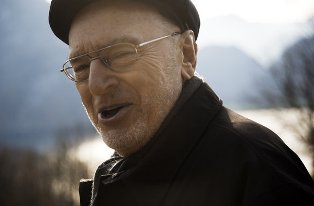
Michael Gielen in Good Company
Michael Gielen is in good company. The former Cincinnati
Symphony Orchestra music director has been named winner of the 2010 Ernst von
Siemens Music Prize, joining previous winners such as Benjamin Britten, Olivier
Messiaen, Mstislav Rostropovich, Herbert von Karajan, Pierre Boulez, Leonard
Bernstein and Daniel Barenboim.

The prestigious award, called the “Nobel Prize of Music,” is given annually by the Bavarian Academy of Fine Arts in Munich on behalf of the Ernst von Siemens Foundation for Music to a composer, performer or musicologist who has made an extraordinary contribution to the music world. The prize carries a stipend of 200,000 euros (equal to roughly $270,000) and will be presented at ceremonies in Munich's Cuvillies Theatre May 5.
Gielen, whose tenure in Cincinnati (1980-86) was marked by controversy because of his focus on modern music, received the honor for “his life’s work,” according to the announcement released by the Siemens Foundation. “Gielen is one of the few conductors who have not only served, but also helped to form and change musical culture.”
In an essay by Rainer Peters posted on the Siemens Foundation website, Gielen’s commitment to music of his contemporaries stems from his belief in the 'indivisibility’ of music. "He thought it only natural to give attention to living composers just as to those of the past. He felt it to be not only his ‘duty and inclination,’ he also had the ability -- the baton technique, an unerring ear, a quick eye -- to decipher the highly complex scores of Stockhausen, Nono, Boulez, Berio, Ligeti and Lachenmann and to teach them with emphatic and not seldom feared authority to both musicians and audiences .”
Born in Dresden in 1927, Gielen immigrated to Argentina in 1940 with his family. His father was Josef Gielen, a well known director and head of the Burgtheater in Vienna, who directed first performances of operas by Richard Strauss. His mother was Jewish actress Rose Steurmann, who performed Schoenberg’s “Pierrot Lunaire” in Dresden. One of his uncles was famed pianist Eduard Steuermann. In 1949, Michael Gielen performed Schoenberg’s complete works for piano in honor of the composer’s 75th birthday.
Gielen originally intended to become a composer, but put that ambition aside to serve the music of others through performance and conducting. He began at the Teatro Colon in Buenos Aires, serving as repetiteur (rehearsal pianist and vocal coach). He returned to Europe in 1950 and began working at the Vienna State Opera, where he rubbed shoulders with the great maestros of the day, including Karl Böhm, Clemens Krauss, Dmitri Mitropoulos and fellow Siemens-prize-winner Karajan. He became director of the Frankfurt Opera in 1977 and general music director of the City of Frankfurt. In addition to cutting edge opera productions, he invented “musical montage,” Peters writes, a practice he continued in Cincinnati that has since been taken up by many conductors, including James Levine at the Boston Symphony and Paavo Järvi, now music director of the CSO.
“Musical montage” is combining familiar, often canonical works like Beethoven’s Ninth Symphony with lesser known, usually more contemporary ones, like Schoenberg’s “Survivor from Warsaw” (which Gielen did with the CSO). After Cincinnati, he became chief conductor of the Southwest German Radio at Baden-Baden, where he was able to pursue his holistic philosophy about music over a distinguished 13-year span (1986-99). He has gone on to record the complete cycle of Mahler’s Symphonies, as well as much-admired recordings of Beethoven, Brahms and Bruckner, while giving committed service to the music of our time.
Peters describes him as “a rare example of an intellectual musician, historically and philosophically well-versed, a thoughtful conductor, an analytical mind.” In his 2005 memoirs, Gielen elaborates on his belief about the role of music and art in society, i.e. to communicate “everything” about mankind -- sometimes including things people would rather not hear -- and also to provide transcendental moments.
For Peters' complete essay, see http://www.evs-musikstiftung.ch/en/ernst-von-siemens-music-prize/prize-winner-2010/michael-gielen/essay/Works introduced by Gielen on CSO concerts include: Elliott Carter's Piano Concerto (1964-65) with pianist Ursula Oppens; Charles Ives' Symphonies No. 2 and 4; Franz Schreker's Chamber Symphony; Pierre Boulez' "Rituel"; Bruno Maderna's Concerto for Oboe and Orchestra with oboist Heinz Holliger; Berg's Chamber Concerto for Piano, Violin and Thirteen Wind Instruments; Webern's "Das Augenlicht," Five Pieces for Orchestra (Op.10 and Op.post.), "Entflieht auf leichten Kähnen" and Variations for Orchestra (Op. 30); Schoenberg's "Erwartung" with soprano Phyllis Bryn-Julson; George Crumb's "Star Child"; Berg's "Der Wein" (Bryn-Julson); Earl Kim's "Where Grief Slumbers"; Frank Proto's Dialogue for Synclavier and Orchestra, and many, many others.
Perhaps ironically, the last work Gielen conducted as Cincinnati Symphony Orchestra music director was Tchaikovsky’s Symphony No. 6 (“Pathetique”) at Riverbend in 1986.
He returned to guest conduct the CSO during its 1994-95 centennial season, leading Beethoven's Leonore" Overture No. 2 on the April 2, 1995 centennial gala at Music Hall and Mahler's Symphony No. 6 on subscription concerts April 7 and 8, 1995, also at Music Hall.
Gielen continued to compose throughout his career, but as a
sideline. His quartet “Un Vieux Souvenir,”
commissioned by Ann Santen, former general manager of radio station
WGUC-FM, was premiered by the LaSalle Quartet at the University of
Cincinnati College-Conservatory of Music in 1986. It will be performed by the Minguet Quartet at
the ceremony in Munich May 5, with Santen in attendance.